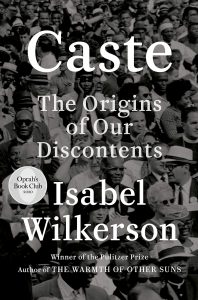 By Mike Greenwood
By Mike Greenwood
Sometimes I can approach a book naively as I did with Isabelle Wilkerson’s Caste. As I reserved the book from my local library, I remember thinking that “caste” is something I know happens in India but here, where I live? No way. Little did I realize or anticipate that I would be challenged again and again with her provocative premise that there is an unspoken caste system in the United States of America.
Caste was not a comfortable read especially given I read it in the context of Black Lives Matter vigils and protests, the trials of police offers who were acquitted of killing black men and women, and the reckoning by a lot of white folks that we have ignored systematic racism in our institutions and policies.
In the context of this crisis, Isabel Wilkerson laid out a case for systematic classism by identifying eight underlying pillars of a caste system and using examples, often from her own life, of how they operated in Nazi Germany, in India and within the United States. Allow me to share two of the multitude of examples she provides in her 496-page book:
- Nazi Germany was looking internationally for laws to protect and promote the “superior” Aryan race, and identified an ideal model for their legal justification of bigotry and eventual killings – the United States of America and our Jim Crow laws. Wilkerson notes that even the German researchers from that time were “confounded by the lengths to which America went to segregate its population.”
- Alongside tracing the history of caste Wilkerson traces the notion of race, because, as she explains, race is about caste. “Race does the heavy lifting for a caste system that demands a means of human division. Until the birth of the new nation of The United States of America, no one had heard of the word ‘black’ as a race. No one in Africa. Everyone there is African.” She adds that when, “People do cruel things against a person of different colour for no other reason than the colour – that’s racism. People who do cruel things to others in order to ‘put them in their place’ – that’s casteism.”
At times, I thought Wilkerson dwelled too much on how Trump and Republican policies supported our caste system. But reflecting back on my reading of Caste, after the January 6th insurrection, I understand why she did. Many of those policies kept a small minority encased in power and influence through their status and wealth. Finally, several months after reading Caste, I continue to question much which I never questioned before – questions as to how our laws, polices and white supremacy all support the walls of our caste system.

